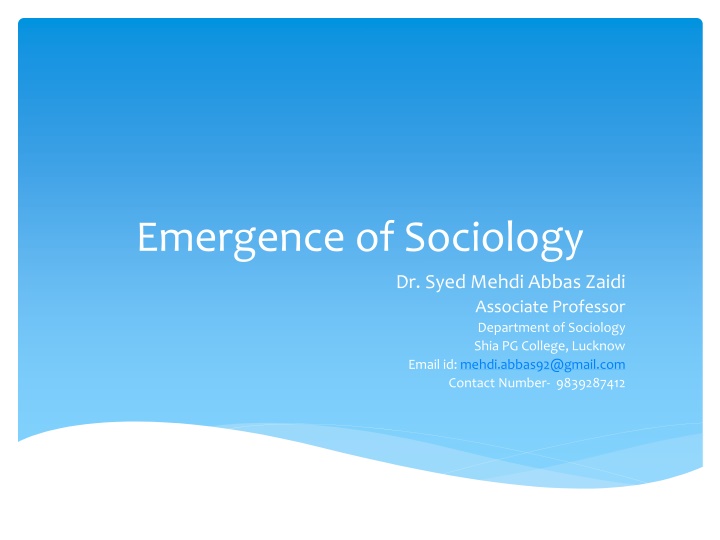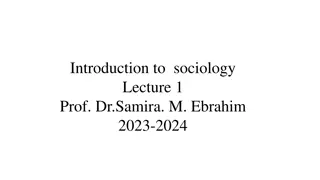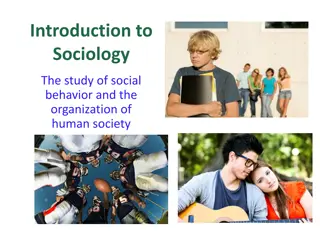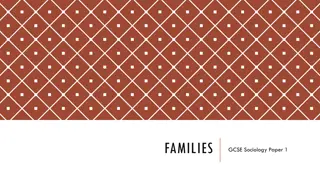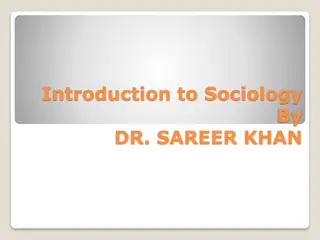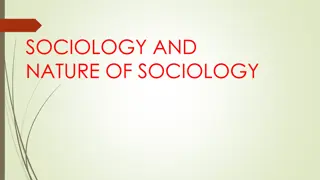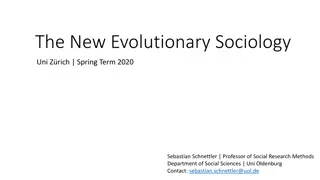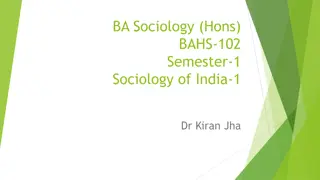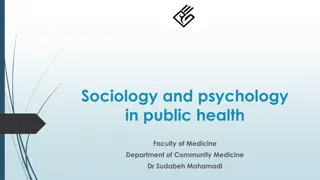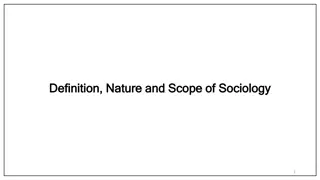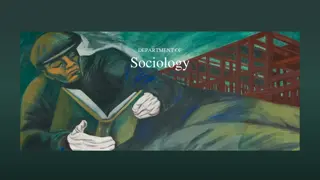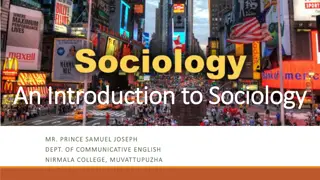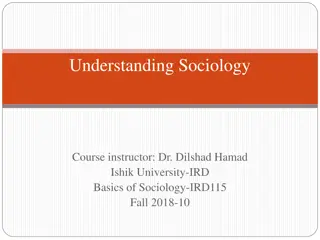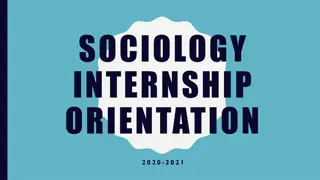The Emergence of Sociology: A Historical Overview
Sociology, derived from Latin and Greek roots, has evolved over centuries through various stages, influenced by social, economic, and political factors. Key thinkers like Plato, Aristotle, Hobbes, Locke, Rousseau, Montesquieu, Comte, Durkheim, and Marx have shaped the discipline. The Industrial Revolution and French Revolution played significant roles in shaping modern sociology. This discipline emerged amidst societal changes, from trade expansion to the rise of the middle class, reflecting shifts in governance, economy, and societal structure.
Download Presentation

Please find below an Image/Link to download the presentation.
The content on the website is provided AS IS for your information and personal use only. It may not be sold, licensed, or shared on other websites without obtaining consent from the author.If you encounter any issues during the download, it is possible that the publisher has removed the file from their server.
You are allowed to download the files provided on this website for personal or commercial use, subject to the condition that they are used lawfully. All files are the property of their respective owners.
The content on the website is provided AS IS for your information and personal use only. It may not be sold, licensed, or shared on other websites without obtaining consent from the author.
E N D
Presentation Transcript
Emergence of Sociology Dr. Syed Mehdi Abbas Zaidi Associate Professor Department of Sociology Shia PG College, Lucknow Email id: mehdi.abbas92@gmail.com Contact Number- 9839287412
Origin of term Sociology The Word Sociology is derived from both Latin and Greek. The Latin word: Socius means Companion and the Suffix logy means the study of , is from Greek. It was coined in 1780 by the French essayist Emmanuel Joseph in an unpublished manuscript.
Emergence of Sociology in West T.B. Bottomore in 1942 has given four stages of the Origin and Development of Sociology. First stage - Plato in his book 'The Republic' and Aristotle presented society in a narrow way through his book Ethics and Politics . Second stage - It is believed to be from the 3rd to the 17th century in which social life was understood on philosophical and religious grounds. Its principal thinkers are Thomas Aquinas and Dante.
Continuum Third stage - starting from the 15th century, Sociology began to take its shape and at this time, society and state were used in the same sense. Hobbes, Locke and Rousseau are the leading thinkers of this time. Fourth stage - It starts from the mid-17th century. The two major events of this time are the Industrial and the French Revolution. Sociology developed very rapidly by 1750. Its main thinkers are Montesquieu, Comte, Durkheim, Spencer, Marx etc.
Social, Economic, and Political factors of emergence of sociology Renaissance Period Expansion of trade and commerce Rise of middle class Growth of science and scientific thought Transition from feudalism to industrialism Structural changes in society- migration and urbanism
Continuum Industrial revolution increased the material wealth of humanity, especially among the nations of the west. It increased longevity and accelerated the growth of the middle class. It helped create the modern world view that through the proper use of science and technology, a more fruitful quality of life could be achieved.
The French Revolution The three estates Before the revolution the French people were divided into three groups: The first estate: The Clergy The second estate: The Nobility The third estate: The Common people (bourgeoisie, urban workers, and peasants). Legally the first two estates enjoyed many privileges, particularly exemption from most taxation.
The Three Estates The first estate was of Catholic Church officials. The second state was of Nobility with the exception of a few liberals, the nobility wanted greater political influence for themselves. The third estate bore the entire burden of tax. Tithe- 1/10thof the agricultural produce and Taille- Tax paid to the state.
Revolution During the French revolution that began in 1789, France s class system changed dramatically. Aristocrats suddenly lost their money and status, while peasants, who had been at the bottom of the social ladder, rose to more powerful and influential positions. In the case of sociology this central core, the nucleus of all its speculation, is the concept of social group; and any investigation of the origins of systematic sociology is at bottom an inquiry into the social and intellectual conditions which resulted in the appearance of this concept .
Industrial Revolution Industrial revolution followed on the heels of the French revolution, unfolding in Western Europe throughout the 1800s. During industrial revolution, people abandoned a life of agriculture and moved to cities to find factory jobs. They worked long hours in dangerous conditions for low pay. New social problems emerged and, for many decades, little was done to address the plight of the urban poor.
Major changes during Industrial Revolution Europe was changing from agriculture to factory production. Masses of people moved to the cities in search of work. In cities people met anonymity, crowding, filth, and poverty. Industrial revolution challenged the traditional order an opened the door for democratic changes. Social changes undermined the traditional explanations of human existence.
Intellectual sources: Enlightenment The Enlightenment was an intellectual movement in Europe during the 18th century in which people began to change their views on the world and on society. Enlightenment Principles Religion, tradition, and superstition limited independent thought Accept knowledge based on observation, logic, and reason, not on faith. Scientific and academic thinking should be based on reasoning, not on church. It include a number of writers living at different times in various countries.
Continuum It challenged old ways of thinking. It questioned divine-right od rule. Believed that social reforms were necessary and possible in this life, not just the next.
Enlightenment Thinkers Voltaire- 1650- 1722 Rousseau- 1712- 1778 Thomas Hobbes- 1588- 1679 John Locke- 1632- 1704 Montesquieu- 1689- 1755
Scientific Revolution Led people to view the world in a different light. Challenged the power of the Church. Formed the foundation of all modern sciences. Is followed by the enlightenment. Scientific revolution showed that nature and universe could be explained through reason, using mathematical precision. People began to believe that they could explain the workings of the society and the relationships of people in terms of scientific study.
Philosophy of history Among the thinkers who developed this philosophy, the names of Vico, Rousseau, Ferguson, and Hegel are prominent. These thinkers theorized history and explained that history transitioned from one stage to another. The idea of dividing history into stages and the concept of development came to sociology from the philosophy of history.
Continuum Hegel's interpretation of the philosophy of history is based on the direction of change of society. He interpreted history on the basis of dialectical method. Hegel believed that change in society is caused by change in thought.
Political Philosophy This philosophy influenced the rise of sociology. It had two streams: the first one was to emphasize on the system in which Hobbes, Locke, and Rousseau were prominent. Hobbes, Locke, and Rousseau presented the principle of social settlement of the origin of the state. According to them, the state was born as a result of the contract of the people. The second section was to emphasize change, with Robert Oven, Saint Simon and Charles Fournier leading the way. Saint Simon made a scientific study of the structure of class and property.
Emergence of Sociology in India We find the growth of sociology as a discipline is a product of Western intellectual discourse. Sociology as a discipline emerged as the contributions made by social thinkers, philosophers, administers who worked at understanding the Indian society. However, writings about society can be traced back to the ancient Indian mythological, religious and spiritual texts such as the Veda, Upanishads, Puranas, Smritis, writings of Kautilya and Sukracharya that talk volumes about rites, laws, customs, economy, polity, culture, morality, aesthetics and science.
Continuum During British period, the rapid acquisition of knowledge of Indian Society and the intensification of missionary activities began to develop from 1760 onward. Missionaries and British officials made earnest effort to study the social life and culture of people of India. The growth of sociology and anthropology passed through three phases such as. 1. First phase - 1773-1900. 2. Second phase - 1901-1950. 3. Third phase - 1950 till date.
Prominent Thinkers M.N. Srinivas Gail Omvedt Patrick Geddes G.S. Ghurye Andre Beteille Yogendra Singh T.K. Oommen A.R. Desai S.C. Dubey Louis Dumont Radhakamal Mukherjee D.P. Mukherjee Irawati Karve P.H. Prabhu K.M. Kapadia And many more
Reference Ritzer, George- Sociological Theory Turner J.H.- The Structure of Sociological Theory
